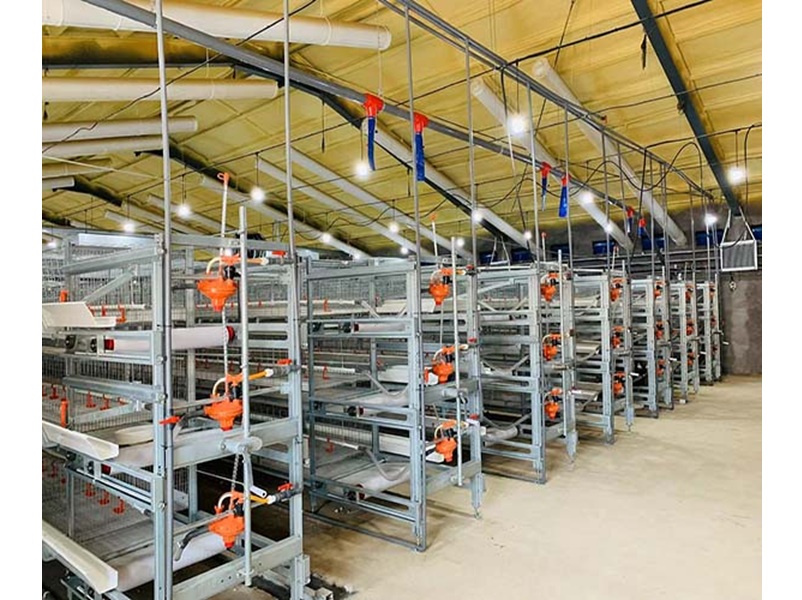Durable Broiler Chicken Cage Equipment for Large Farms
Introduction
Broiler chicken farming is a critical component of the global poultry industry, providing a significant source of protein through meat production. Large-scale broiler farms require efficient, durable, and well-designed cage systems to maximize productivity, ensure bird welfare, and maintain hygiene standards.
Durable broiler chicken cage equipment plays a vital role in modern poultry farming by optimizing space, improving feed efficiency, reducing labor costs, and enhancing disease control. This article explores the key features, benefits, and considerations for selecting high-quality Broiler Cage Systems for large farms.
---
Key Features of Durable Broiler Chicken Cage Equipment
1. High-Quality Materials
The durability of broiler cages largely depends on the materials used in their construction. Common materials include:
- Galvanized Steel: Resistant to rust and corrosion, ensuring longevity even in humid environments.
- Stainless Steel: Offers superior durability and hygiene but is more expensive.
- Reinforced Plastic Components: Used for feeders, drinkers, and flooring to reduce wear and tear.
2. Modular and Scalable Design
Large farms require flexible cage systems that can be expanded or reconfigured as needed. Modular designs allow farmers to:
- Adjust cage sizes based on flock requirements.
- Easily add or remove sections for maintenance or expansion.
- Optimize space utilization in poultry houses.
3. Automated Feeding and Watering Systems
Modern broiler cages often incorporate automation to improve efficiency:
- Automatic Feeders: Ensure consistent feed distribution, reducing waste and labor.
- Nipple Drinkers: Provide clean water on demand, minimizing spillage and contamination.
- Feed and Water Monitoring: Some systems include sensors to track consumption and detect malfunctions.
4. Proper Ventilation and Climate Control
Broilers are sensitive to temperature and humidity fluctuations. High-quality cage systems should:
- Allow adequate airflow to prevent heat stress and respiratory issues.
- Integrate with ventilation systems to maintain optimal conditions.
- Support cooling or heating mechanisms in extreme climates.
5. Easy-to-Clean and Sanitary Construction
Hygiene is crucial in preventing disease outbreaks. Durable cages should feature:
- Smooth, non-porous surfaces that resist bacterial growth.
- Removable trays or slatted floors for easy waste removal.
- Accessible design for thorough cleaning and disinfection.
6. Comfortable Flooring and Space Optimization
Broilers require sufficient space to move and grow without stress. Key flooring considerations include:
- Slatted or Wire Mesh Floors: Allow droppings to fall through, keeping birds clean.
- Non-Slip Surfaces: Prevent leg injuries and improve mobility.
- Adequate Space per Bird: Follow industry standards to avoid overcrowding.
7. Robust Structural Integrity
Large farms need cages that can withstand daily wear and tear. Features to look for include:
- Reinforced frames to support multiple bird cycles.
- Secure locking mechanisms to prevent accidental openings.
- Heavy-duty welds and joints to prevent breakage.
---
Benefits of Using Durable Broiler Chicken Cages in Large Farms
1. Increased Productivity and Growth Rates
Well-designed cages promote uniform growth by:
- Ensuring all birds have equal access to feed and water.
- Reducing competition and stress among broilers.
- Optimizing environmental conditions for faster weight gain.
2. Lower Mortality Rates
Durable cages contribute to bird health by:
- Minimizing injuries from sharp edges or poor flooring.
- Preventing contamination from accumulated waste.
- Reducing disease transmission through better hygiene.
3. Reduced Labor Costs
Automation and efficient cage designs help:
- Decrease manual feeding and watering efforts.
- Simplify cleaning and maintenance procedures.
- Allow fewer workers to manage larger flocks.
4. Improved Feed Conversion Ratio (FCR)
Efficient feeding systems reduce waste and ensure optimal nutrition, leading to:
- Lower feed costs per kilogram of meat produced.
- Faster growth with less feed expenditure.
- Higher profitability for large-scale operations.
5. Better Disease Control
Sanitary cage systems minimize pathogen buildup by:
- Preventing direct contact with feces.
- Allowing easy disinfection between batches.
- Reducing the risk of bacterial and viral infections.
6. Long-Term Cost Savings
Investing in durable cages reduces replacement and repair costs over time, offering:
- Extended equipment lifespan.
- Fewer breakdowns and maintenance expenses.
- Higher return on investment (ROI) for poultry farmers.
---
Considerations When Choosing Broiler Chicken Cage Equipment
1. Farm Size and Capacity
- Determine the number of birds per batch and required cage tiers.
- Ensure the system can be scaled as the farm expands.
2. Climate and Environmental Conditions
- Select materials that resist humidity, heat, or cold based on location.
- Ensure proper ventilation integration to prevent heat stress.
3. Budget and Cost-Effectiveness
- Balance initial investment with long-term durability.
- Compare different materials and automation levels for cost efficiency.
4. Compliance with Animal Welfare Standards
- Follow local and international guidelines on space per bird.
- Avoid overcrowding to prevent stress and injuries.
5. Ease of Maintenance
- Choose cages with removable parts for cleaning.
- Ensure spare parts are readily available for repairs.
6. Supplier Reputation and Support
- Research manufacturers with proven durability and reliability.
- Check for warranties and after-sales service.
---
Conclusion
Durable broiler chicken cage equipment is essential for large-scale poultry farms aiming for efficiency, profitability, and bird welfare. High-quality materials, automation, and proper design contribute to better growth rates, lower mortality, and reduced operational costs.
When selecting cage systems, farmers should prioritize durability, hygiene, and scalability to maximize long-term benefits. By investing in robust broiler cages, large farms can achieve sustainable production while maintaining high standards of animal care and biosecurity.
As the poultry industry continues to evolve, advancements in cage technology will further enhance productivity, making durable broiler cages a cornerstone of modern poultry farming.

 Catalogue
Catalogue








 WhatsApp
WhatsApp Phone
Phone
Comment
(0)